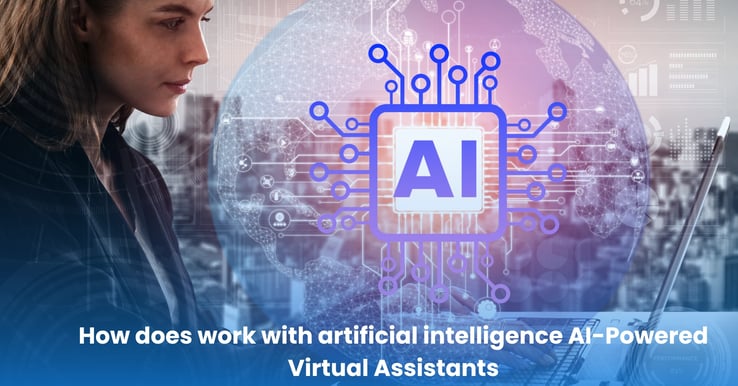How AI Will Transform the Virtual Assistant Industry in the Next 5 Years
Allan Q. Amit
6/8/20253 min read


How AI Will Transform the Virtual Assistant Industry in the Next 5 Years
The Virtual Assistant (VA) industry has long been driven by human ingenuity, adaptability, and remote operational support. But with artificial intelligence advancing at an unprecedented pace, the VA landscape is about to undergo a radical transformation. In the next five years, AI won’t just assist Virtual Assistants—it will redefine the industry’s very foundation.
As an AI development expert, I’ll walk you through what’s coming, what it means for VAs, and how businesses and freelancers alike can future-proof themselves in a rapidly shifting market.
1. Rise of AI-Powered VAs: The Automation Inflection Point
The rise of tools like ChatGPT, Claude, and Microsoft Copilot signals the start of a broader trend: AI VAs will soon handle a large portion of the repetitive, rules-based, and time-consuming tasks that human VAs manage today.
What AI Will Handle:
Inbox & Calendar Management (auto-prioritization, smart replies, scheduling)
Data Entry & Reporting (real-time updates across platforms)
Customer Service Chat Support (24/7 multilingual support)
CRM Updates, Lead Tagging, Pipeline Movement
Basic Content Creation (emails, social posts, outlines)
By 2030, it's estimated that over 60% of administrative VA tasks will be AI-augmented or fully automated.
2. The New VA: From Task Doer to AI Operator
The traditional VA role will evolve. Tomorrow’s most valuable VAs won’t be measured by how much manual work they can do—but by how well they can design, oversee, and fine-tune AI workflows.
What That Looks Like:
Training AI models with client-specific preferences (e.g., tone, brand voice)
Managing AI-generated content before delivery
Creating automations between tools like Zapier, Notion AI, Slack, and CRMs
Acting as an AI concierge for busy executives—ensuring AI actions align with human context and business strategy
Think of VAs becoming AI-powered digital operations managers—not admin clerks.
3. Cost Compression & Global Competition: The Pressure is On
AI’s scalability will lead to massive price compression. A startup could pay $20/month for AI tools that previously required a $2,000/month VA. This doesn’t mean human VAs disappear—but the low-skill, high-volume tasks will be commoditized.
What does that mean?
Firms in the Philippines, India, and LATAM that rely on volume-based VA services must pivot fast
Agencies will need to bundle AI + Human hybrid packages to remain competitive
Freelancers must retool and move up the value chain to survive
4. Niche VAs Will Thrive: Specialists > Generalists
The VAs who survive (and thrive) will be those who specialize. AI can handle generic tasks. But it struggles with nuance, emotional intelligence, and highly specific domains—areas where niche VAs will dominate.
Examples:
Real Estate VA + AI CRM Assistant
E-Commerce VA + AI Product Listing Generator
Legal Admin VA + AI Contract Summarizer
Executive Assistant + AI Calendar Optimizer
Being a jack-of-all-trades VA will no longer be a competitive edge. Depth will beat breadth.
5. New Tools Will Become Standard: AI Literacy Is Mandatory
AI tools will no longer be “nice to have”—they’ll be the standard across every VA stack.
Core Tools VAs Need to Learn by 2026:
Zapier/Make.com: No-code automation of workflows
ChatGPT / Claude / Gemini: Prompt engineering, content generation, summarization
Notion AI / ClickUp AI / Motion AI: Task and project management assistants
Loom AI / Descript: For voice and video communication refinement
Trello AI, Slack AI, CRM Co-Pilots: Native integrations for smoother collaboration
The New Hiring Criteria for Clients:
“Do you know how to manage AI systems for my workflow?”
Will replace…
“Can you do data entry and organize my calendar?”
6. AI Doesn’t Kill Jobs—It Changes Them (If You Evolve)
The narrative that AI will replace all human jobs is misleading. AI is a tool. Those who understand how to use the tool will be more valuable than ever.
What VAs Should Do Right Now:
Upskill in AI literacy (take courses on prompt writing, AI automation, and integration tools)
Learn systems thinking to understand how different platforms connect
Develop industry-specific expertise (medical, legal, ecom, finance)
Rebrand yourself as an AI-enabled problem-solver, not just an assistant
7. What This Means for Clients and Business Owners
For companies relying on VAs, here’s what the future holds:
Higher ROI: AI-augmented VAs get more done with fewer hours
More Strategic Support: VAs will help automate parts of your business, not just support them
Better Scalability: One VA can manage what used to require a team—if supported by the right tech stack
Faster Turnaround: With AI co-pilots, turnaround times drop dramatically
This is a golden opportunity for startups and SMBs to build lean, AI-augmented ops teams using global talent.
Conclusion: The Future Belongs to the AI-Empowered VA
The VA industry isn’t dying. It’s transforming. And like every technological revolution, those who adapt early will gain a significant edge.
In five years, Virtual Assistants won’t just support businesses—they’ll help run them. Those who embrace AI, upskill strategically, and think like digital strategists will write the next chapter of the remote work revolution.
